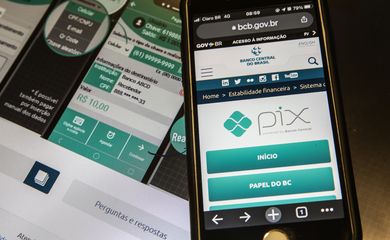Financial market projects inflation at 10.18% for this year

The financial market forecast for the Extended National Consumer Price Index (IPCA), considered to be the country's official inflation, rose from 10.15% to 10.18% this year. This was the 35th consecutive rise in the projection. The estimate is in today's Focus Bulletin (6), a survey released weekly by the Central Bank (BC), in Brasília, with the institutions' expectations for the main economic indicators.

For 2022, the inflation estimate rose from 5% to 5.02%. For 2023, the forecast went from 3.42% to 3.50% and for 2024 it was maintained at 3.10%.
The forecast for 2021 is above the inflation target that should be pursued by the BC. The target, defined by the National Monetary Council (CMN), is 3.75% for this year, with a tolerance interval of 1.5 percentage points up or down. That is, the lower limit is 2.25% and the upper limit is 5.25%. For 2022 and 2023, the targets are 3.5% and 3.25%, respectively, also with a tolerance interval of 1.5 percentage points.
Interest rate
To achieve the inflation target, the Central Bank uses as its main instrument the basic interest rate, the Selic, set at 7.75% per year by the Monetary Policy Committee (Copom). At the last Copom meeting this year, scheduled for tomorrow and Wednesday (8), the financial market forecasts that the Selic will rise to 9.25% per year.
By the end of 2022, the estimate is that the base rate will reach 11.25% per year. And for 2023 and 2024, the forecast is for Selic at 8% a year (last week's forecast was 7.75% a year) and 7% a year, respectively.
When the Copom increases the basic interest rate, the purpose is to contain the heated demand, and this affects prices because higher interest rates make credit more expensive and stimulate savings. In addition, banks consider other factors when defining the interest charged to consumers, such as risk of default, profit and administrative expenses.
When the Copom reduces the Selic, the tendency is for credit to become cheaper, with incentives for production and consumption, reducing inflation control and stimulating economic activity.
GDP and exchange
The financial institutions consulted by BC reduced the projection for the growth of the Brazilian economy this year from 4.78% to 4.71%. For 2022, the expectation for the Gross Domestic Product (GDP) - the sum of all goods and services produced in the country - is a growth of 0.51%. Last week, the expansion estimate was 0.58%. In 2023 and 2024, the financial market projects GDP growth of 1.95% and 2.10%, respectively.
Expectations for the dollar exchange rate rose from R$ 5.50 to R$ 5.56 by the end of this year. For the end of 2022, the forecast went from R$ 5.50 to R$ 5.55.
Text translated using artificial intelligence.




Dê sua opinião sobre a qualidade do conteúdo que você acessou.
Escolha sua manifestação em apenas um clique.
Você será direcionado(a) para o sistema Fala.BR, mas é com a EBC que estará dialogando. O Fala.BR é uma plataforma de comunicação da sociedade com a administração pública, por meio das Ouvidorias.
Sua opinião ajuda a EBC a melhorar os serviços e conteúdos ofertados ao cidadão. Por isso, não se esqueça de incluir na sua mensagem o link do conteúdo alvo de sua manifestação.
Clique aqui para mais informações sobre a Ouvidoria da EBC.








